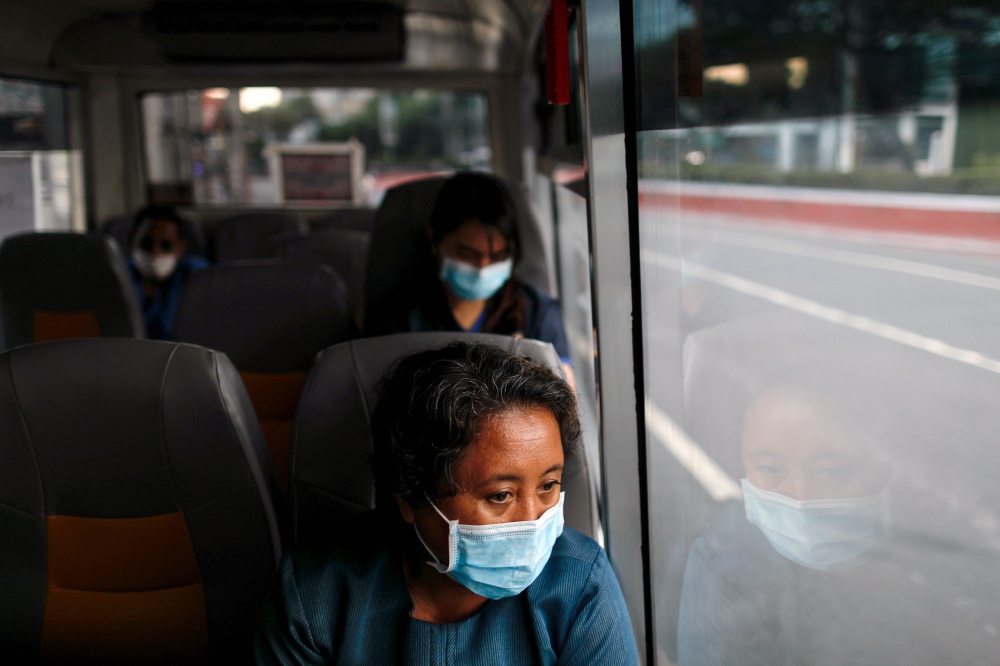Manila, The Philippines
Reuters
Janitor Ritchie Estabillo was on his way to work when he was confronted by five men who poured bleach over his face, one of a growing number of hospital staff suffering abuse in the Philippines amid panic over coronavirus infections.
His employer said Estabillo had been checked over and was unharmed but called the attackers “vile individuals” who could have cost him his sight.
“Our [member of staff] is a breadwinner, as many of our frontliners are, who in the present pandemonium choose to bravely continue their duties,” the St Louis Hospital in the province of Sultan Kudarat said of Friday’s incident.
“They remain unfazed by the discrimination that healthcare workers now face.”

A medical worker wearing a protective mask rides a free shuttle service for healthcare workers following the suspension of mass transportation in Metro Manila to contain the spread of the coronavirus disease (COVID-19), in Manila, Philippines, on 30th March. PICTURE: Reuters/Eloisa Lopez
Estabillo was not alone. That same night, a nurse in Cebu City had chlorine thrown at him, according to his superior, who told Reuters the nurse was unharmed.
“We are not the enemies here,” said the doctor, who asked not to be identified because she was not authorised to speak to media. “We are facing the threat every day in the hospital.”
Such stigma is something the Philippines could do without, with hospitals already struggling with a shortage of protective gear, manpower and testing capacity, adding to uncertainty about the extent of the virus spread.
There are signs of unease about health workers in other developing nations with under-resourced public healthcare systems, like Myanmar and India, which have a history of tensions and paranoia being fanned easily by misinformation on social media.
Medical workers have also won praise worldwide, with Britain scheduling a nationwide clap for National Health Service staff last week, and similar enthusiasm shown in India, France, Spain, Italy and elsewhere. Some property owners in Portugal are offering free accommodation to health workers who are afraid of exposing families to the coronavirus.
But also in India, a medical association last week said doctors were being left stranded after being evicted due to fear they could infect neighbours.
Doctors in Myanmar’s second-biggest city, Mandalay, have asked a university to accommodate staff who have been evicted from their lodgings due to coronavirus paranoia. Myanmar has 10 confirmed cases.
“They worry that family members and people will be infected. The dormitory owners told them to move out by the end of the month,” said Khin Maung Win, rector of the University of Medicine, which has prepared 100 rooms for doctors.
Isolated, insulted
Evictions are also taking place in the Philippines, where the department of health on Sunday said physical assault, harassment and discrimination could not be tolerated, with some medical workers being fined at checkpoints for breaching lockdown laws, or being refused transport and laundry services.
A 29-year-old Manila nurse who was among hundreds of medical workers cleared after being quarantined as a precaution told Reuters his family was uncomfortable around him.

Rickshaws block a street from outsiders to protect a neighbourhood from the spread of the coronavirus disease (COVID-19) in Manila, Philippines, on 24th March. PICTURE: Reuters/Eloisa Lopez
His wife’s parents isolated him in a room.
“I felt insulted because I’m not sick and I followed the disinfection guide,” said the nurse, who asked not to be named, and has since moved elsewhere. “I don’t even blame my in-laws.”
A hospital in Japan’s Hyogo prefecture said patients, staff and families were enduring psychological, economic and reputational damage because of health rumours, with some refused transport and other services, or told not to come to work.
Yoshitake Yokokura, president of the Japan Medical Association, said rumours and criticism could hurt doctors and “lead to a collapse of the medical system”.
Public campaigns calling for support for heroic doctors and nurses have gained momentum in many countries, and the World Health Organization has said their safety is paramount.
But there was no hero treatment last week for one hospital in Mariveles in the Philippines, where residents put up barricades to contain staff following the announcement that a patient with coronavirus symptoms had died.
The hospital’s director, Lou Evangelista, now has skeleton staff because workers are petrified.
“They think we are contagious”, she told a radio station.
“We are being bashed on social media. We are being threatened not to go out.”
– Additional reporting by JAMES PEARSON in Hanoi, ED DAVIES in Sydney, ELAINE LIES in Tokyo, JOHN GEDDIE in Singapore and the Yangon bureau.






